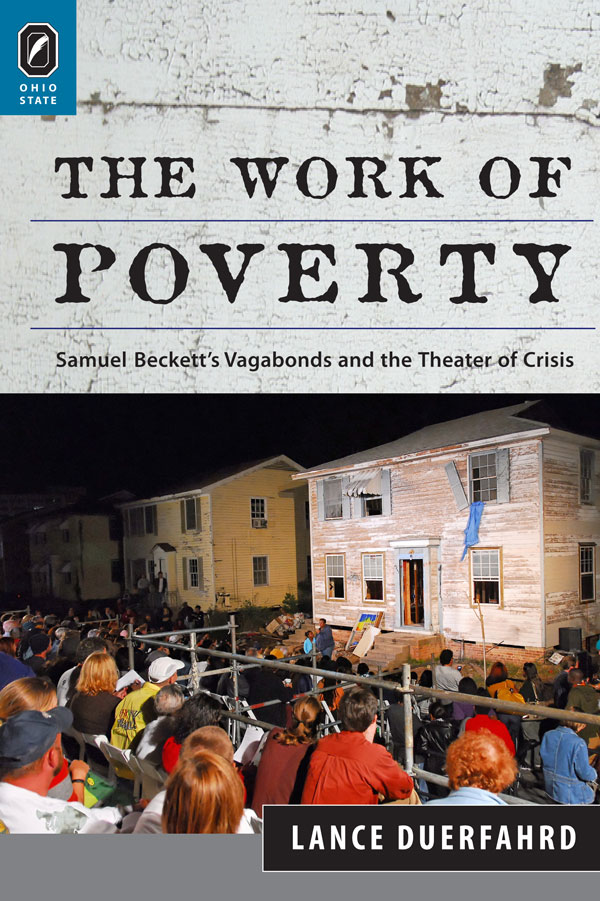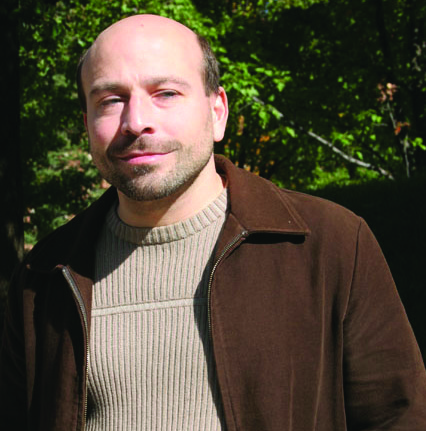The Work of PovertySamuel Beckett’s Vagabonds and the Theater of CrisisLance Duerfahrd |
 10/16/2013 Literary Criticism/ 236 pp. 6x9  $67.95 cloth 978-0-8142-1237-0 Add cloth to shopping cart $29.95 paper 978-0-8142-5425-7 Add paper to shopping cart $14.95 CD 978-0-8142-9339-3 Add CD to shopping cart Shopping Cart Instructions Review/Change Shopping Cart & Check-out | |||
|
Explore More “Teacher of Bad Film 2: Pedagogy,” from Psychoanalyse.lu Waiting for Godot during Occupy Wall Street Lance Duerfahrd Interviews Rick Cluchey Following His Performance in Krapp’s Last Tape Rick Cluchey on Samuel Beckett, Los Angeles, 2008 “Occupy Wall St.: We’re Getting On and the Zero Emission Book Project,” from The Outlet |
“The Work of Poverty is an impassioned meditation on the theater in times of crisis, penury, and precariousness. Lance Duerfahrd accounts for the enduring appeal of a play like Waiting for Godot and, what is more, makes the reader experience the excitement felt by underprivileged audiences and actors in situations of danger or terror.” —Jean-Michel Rabaté, Vartan Gregorian Professor in the Humanities and professor of English and Comparative Literature at the University of Pennsylvania “Lance Duerfahrd investigates Beckett’s continuing relevance to our world and the conditions under which Godot speaks not just as intellectual enigma to scholars of literature but empathetically and urgently to the survivors of life in prison, civil war, and floods. The Work of Poverty is energized by an eye toward this relevance, not only for these audiences in what Duerfahrd terms ‘landscapes of crisis,’ but for the author and his reader.” —Eyal Peretz, Indiana University, Bloomington “Duerfahrd’s The Work of Poverty: Samuel Beckett’s Vagabonds and the Theater of Crisis honors the life of Beckett’s legacy: poetic despairing themes matrixing human historical constants, desperation without destination, the poetry of man’s universal suffering.” —Rick Cluchey, Co-Founder of the San Quentin Drama Workshop How did Samuel Beckett’s Waiting for Godot come to be performed in such places as San Quentin Prison, Mississippi during the Civil Rights Movement, Sarajevo under military siege, New Orleans’s Lower Ninth Ward after Hurricane Katrina, and Zuccotti Park during the Occupy Wall Street protests? The Work of Poverty: Samuel Beckett’s Vagabonds and the Theater of Crisis studies the appeal of Godot to audiences in settings of historical crisis and suffering. Lance Duerfahrd argues that these circumstances transform the performance and the reception of the play, thereby illuminating a cathartic and political dimension of Beckett’s work that goes unseen in traditional performance contexts. The resonance of one of the most canonical plays of the twentieth century within landscapes of disaster fulfills the aesthetic of “ultimate penury” that Beckett hones in his work. Here the subtractive and reductive dynamic of the Nobel Prize–winning author’s craft comes into clearer view, echoing with the despondent condition beyond the stage. In developing an aesthetic of penury, The Work of Poverty brings together the dispossessed characters in Godot; the derelict narrators of Beckett’s Molloy, Malone Dies, and the Unnamable; and the formal experimentation in poverty witnessed in his Endgame and Worstward Ho. Beckett forged increasingly destitute forms of theater and prose on the periphery of writing. Duerfahrd illustrates how this work speaks to our age by emphasizing characters on the periphery of society.
| |||


 Lance Duerfahrd
Lance Duerfahrd